“Come eat, Elden. I’ve got your favorite
meal”, called Lois from the small
trailer-home kitchen. Elden slowly rose
from the easy chair where he had been
resting that Saturday evening, to sit down
at the kitchen table where Lois Jones
served him baked beans, slow-baked with
molasses, mustard, with plenty of salt
pork. She set down a plate of hot biscuits
with real butter. Then came a piece of
fresh-baked custard pie.
Lois and Arthur Jones had
been awfully good to Elden in his
declining years after he’d foolishly given
away his little house on the banks of
True’s Pond. In the house on the site
where he had been born, he had three
rooms, a kitchen with a large polished
Clarian wood-burning cook stove, a small
bedroom, and his cobbler’s shop in the
room across the back of the house.
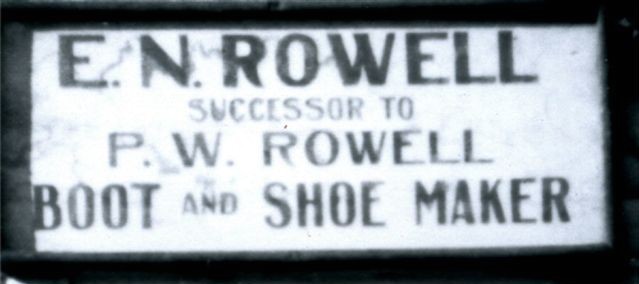 After supper, Elden
returned to the easy chair, closed his
eyes, and reminiscence of the many
adventures of his lifetime. He had lived a
colorful eighty-plus years. Elden enjoyed
telling tales to spell-bound listeners at
the only octagonal-shaped retired post
office in the United States, which housed
the Liberty Historical Society. He had
donated many of his cobbler’s tools to
them, along with the large sign which
read, “E. N. ROWELL, successor to P. W.
ROWELL, BOOT and SHOE MAKER”.
After supper, Elden
returned to the easy chair, closed his
eyes, and reminiscence of the many
adventures of his lifetime. He had lived a
colorful eighty-plus years. Elden enjoyed
telling tales to spell-bound listeners at
the only octagonal-shaped retired post
office in the United States, which housed
the Liberty Historical Society. He had
donated many of his cobbler’s tools to
them, along with the large sign which
read, “E. N. ROWELL, successor to P. W.
ROWELL, BOOT and SHOE MAKER”.
Elden had a remarkable
memory. He could recall the streets of
Liberty, Maine in the early Twentieth
century as though he was walking through
them as he talked. There was the Tannery,
the wood-working shop of Lucius Morse,
where caskets were made and sold, the
woolen mill, stave mill, ax factory,
foundry spring shop powered by water
power, grist mill to grind grain into
flour, broom factory, dance halls, stages
for traveling shows, Knowlton’s tin smith
shop, sliding and skating parties, and the
canning factory where he had been a night
watchman. Elden’s memory of life back then
was so vivid that he’d drawn sketches of
how he remembered the town.
Elden had been born just
down the road from Liberty Village over
the line in Montville, in 1890, the son of
Charles M. and Ida (Sanborn) Rowell. He
had attended the Liberty schools until he
was eighteen years old. His parents
decided to live apart when Elden was two
years old. His father raised Elden and his
two brothers in a house where no woman
resided.
Charles’ brother,
Philander “Wheeler” Rowell had taken over
the cobbler business from their father.
From the time that he was a small child,
Elden had observed his grandfather, and
later his uncle, make shoes and boots. The
family had the cobbler bench, tools to do
‘Saddle-stitching’, hammers, knives,
punches and everything to make a pair of
shoes or boots from a piece of ‘tanned’
leather. The soles were pegged on with
wooden pegs which measured about
five-eighths of an inch long.
Uncle Wheeler would let
Elden work with the leather scraps and
tools from the time he was very young.
When he was thirteen years of age, he
became an apprentice. By the time that he
was fifteen, Elden considered that he was
old enough to go into the cobbler business
by himself. He was taking orders to make
handmade shoes and boots. He could make
three pair in a long ten-hour day, for
which he got $3 for a pair of shoes and $4
for a pair of boots.
But Elden was restless,
wanting to see more of the world than
Liberty Village and South Montville with
its water-powered mills offered.
 On a hot August night in
1908, he and some young friends were
drinking hard cider together. Elden
decided that if he had a dress suit, he
could make his way in the world. That very
night Hollis L. Jackson’s General Store in
South Montville was broken into. All that
was taken was a suit of clothes, a
revolver, and some small incidental items.
Elden had left Liberty. His ‘friends’ told
the Sheriff that Elden Rowell had been
looking for a suit of clothes. The
officers began searching for a
well-dressed, armed culprit.
On a hot August night in
1908, he and some young friends were
drinking hard cider together. Elden
decided that if he had a dress suit, he
could make his way in the world. That very
night Hollis L. Jackson’s General Store in
South Montville was broken into. All that
was taken was a suit of clothes, a
revolver, and some small incidental items.
Elden had left Liberty. His ‘friends’ told
the Sheriff that Elden Rowell had been
looking for a suit of clothes. The
officers began searching for a
well-dressed, armed culprit.
One Monday afternoon, the
Sheriff stepped up to Elden, as he left
the Schooner operated by Capt. Fitz
Patterson, in Belfast, Maine, and asked,
“Are you Elden Rowell?” Elden replied,
“No, I never heard of him.” “Do you come
from Liberty, Maine?” was the next
question. “No”, replied Elden. “I’ve never
been in Liberty in my life.” A man stepped
forward from the crowd, who identified
eighteen-year old Elden Rowell.
Consequently he was arrested and taken off
to jail.
After that escapade,
Elden decided to “go to sea”. He worked as
a deck hand on the sailing ships for
several years. He had even sailed the
South Seas. In 1915, while Elden was
at home in Liberty, he married Leola
Choate.
In Portland, Maine, on
the fourth of July, about 1924, he and a
shipmate went ashore. They went to a
Sparks Brothers Circus that was in town.
After purchasing tickets, they saw a “Men
Wanted” sign. They were immediately hired,
fed a hot meal, and began hoisting tent
poles of the large Three-Ring circus
tents. The next morning his friend was no
where to be found. Elden assumed that the
friend could not do the hard work, and
went back to the ship.
Elden stayed on traveling
with the circus during the summers,
working on the “Big Top” tents, keeping
them in repair, as well as leather harness
work. In the winters, ‘Whitey’, as he was
now called by the circus people, worked in
the harness shop at the winter quarters in
Macon, Georgia. Elden had been in every
state in the continental United States,
Canada, and down to Mexico.
After being away from
home for a few years, one evening Elden
walked into the home that he had shared
with Leola. She stood at the stove
preparing a meal, obviously expecting
another child, with a man seated at the
kitchen table. Elden threw his hat into
the corner, pulled up a chair and said,
“What’s for supper?” After eating the
evening meal, he donned his cap, gathered
up his meager belongings and traveled on
his way. He and Leola divorced.
The Sparks Brothers
Circus eventually got a gas-powered engine
to drive the large tent stakes, which
became ‘Whitey’s’ job for about seven
years. Elden sported tattoos on his
large biceps. He got his favorite tattoo
at The Bowery in New York.
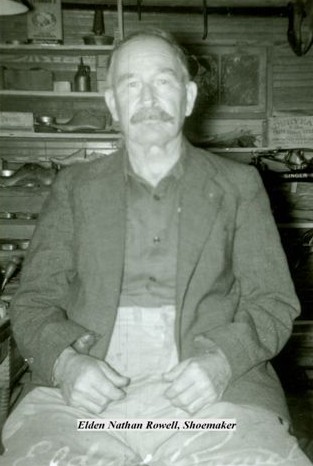 The Coast of Maine was
calling Elden home. He was tiring of the
constant travel. After all, he was a
pretty darn good cobbler. There was plenty
of work back home in Maine, making boots
and shoes. His Uncle P. W. Rowell, a
Master at cobbling, had died in 1911,
while Elden was away. It was time to go
home and settle down..
The Coast of Maine was
calling Elden home. He was tiring of the
constant travel. After all, he was a
pretty darn good cobbler. There was plenty
of work back home in Maine, making boots
and shoes. His Uncle P. W. Rowell, a
Master at cobbling, had died in 1911,
while Elden was away. It was time to go
home and settle down..
In 1926, Elden married a
home-town girl, Bertha M. Davis.
Apparently he wasn’t cut out for married
life, perhaps because of his all-male home
life from his early youth.
Elden remembered that in
his younger days, when he returned from
being a ‘roustabout’ with the Starks
Brothers Circus, he drank hard liquor way
too much. In fact, he called himself “the
worst drunk in town”. He’d given up
drinking many, many years ago. He had
friends who’d say, “Join me in a drink. A
little drink won’t hurt anyone.” His reply
was, “A little drink leads to a lot of
drinks!” and he figured that he didn’t
have to drink to have friends.
Elden recalled walking to
Camden from Liberty, stopping at
Wentworth’s store on Moody Mountain for
his tobacco, and spending the night in a
barn before traveling on his way. The
farmer might never have known that he’d
been there. He might eat an apple or a
vegetable stored in the barn. He’d be
careful not to start any fires, which he’d
have no need to do, as he never
smoked. If Elden had a vice, it was
chewing tobacco. Visitors saw him spit a
stream of ‘tobaccy’ into a saw-dust filled
can, or from the front step, missing his
cat. Of course, if he’d wanted to hit his
cat, he could have.
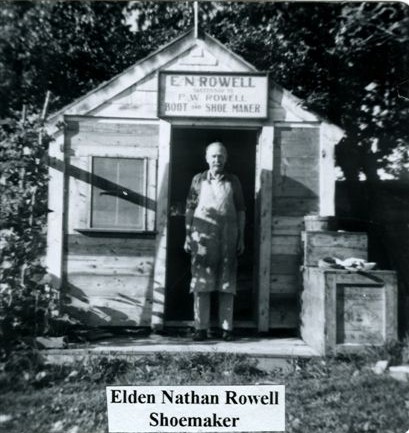 Once he settled down in his
own little house, he’d always had a cat.
The cat would keep rodents from the house,
as well as being great company. Once when
Elden was given a can of Spam, he shared
the contents with his cat. The cat refused
to eat it. Elden said that if the cat
wouldn’t eat it, then it warn’t fit’n to
eat.
Once he settled down in his
own little house, he’d always had a cat.
The cat would keep rodents from the house,
as well as being great company. Once when
Elden was given a can of Spam, he shared
the contents with his cat. The cat refused
to eat it. Elden said that if the cat
wouldn’t eat it, then it warn’t fit’n to
eat.
In his cobbler shop,
Elden made leather heels for the shoes. He
could not understand why people complained
that leather soles were slippery. “Why,”
he commented, “The whole United States was
built on leather.”
In his latter years,
Elden thoroughly enjoyed going to the
Liberty Historical Society, where he sat
and spun tales. No one ever knew if he
embellished on these tales or not. One
tale that he delighted in telling was
about Martin Hannan of Company B of the
Nineteenth Regiment of Maine Volunteers,
who had hung his scythe in a tree in
Montville and gone off to fight in the
Civil War.
Elden recalled that
Martin was a very smart sharpshooter.
Elden had been fourteen years old when
Martin died, having lived in the same
neighborhood. Martin Hannan was a poor
man, who had been wounded in the Civil
War, raising a large family, bringing many
shoes to be repaired at Uncle Wheeler’s
cobbler shop. While waiting for the shoe
repair, Martin had told the young Elden
that when he served in the Civil War,
there was a certain spring of water where
the soldiers filled their canteens, and
knelt down to drink the sparkling water. A
Rebel soldier, who had hidden himself in
the bushes, picked off the Yankee
soldiers, one by one at the spring. A
Union General said that he’d give $100
bounty and promotion to the rank of
Sergeant to any man who could bring in the
Rebel, dead or alive. Elden recalled that
Martin camouflaged himself as a tree,
waiting patiently for the Rebel to appear.
His patience was rewarded when he “did
away” with the sniper. He sent the $100
home to purchase the 100-acre Lermond farm
next-door to his parents’ farm in South
Liberty. Martin soon received the papers
promoting him to Sergeant. Elden delighted
in showing Martin Hannan’s great-grandson,
Bob Maresh, the tree in Montville where
Martin had hung his scythe on the fateful
day in July of 1862 and gone off to War.
Elden enjoyed company and
regaled them with his many tales. Elden
recalled Martin Hannan’s grand-daughter,
Gladys, coming home from Massachusetts for
summer vacation with her Russian-born
husband, Tony Maresh and children. Elden
told Bob that he remembered when he, Bob,
was a three-year old and was very worried
about stepping on the “Flowters” on the
lawn. The “Flowters” were dandelion
blossoms. Elden chuckled when he said that
Bob could trip over the “Flowters” in a
linoleum. He chuckled much as he told his
tales.
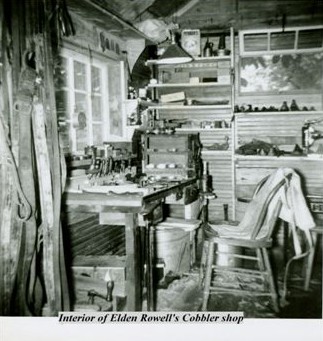 When a customer brought a
pair of shoes to be repaired by his
skilled workmanship, Elden carefully
labeled them. If he was going away, he
would put out his sign, “DON’T LEVE NO
SHOES” with a big padlock on the door.
He’d take a cart, hauling the repaired
shoes to Abbie Hannan below the Village to
deliver to the right customer. He knew
that he could trust Abbie, but there were
a few people that he couldn’t trust “as
far as he could throw them”. He’d make the
mistake of over-trusting a few times in
his life.
When a customer brought a
pair of shoes to be repaired by his
skilled workmanship, Elden carefully
labeled them. If he was going away, he
would put out his sign, “DON’T LEVE NO
SHOES” with a big padlock on the door.
He’d take a cart, hauling the repaired
shoes to Abbie Hannan below the Village to
deliver to the right customer. He knew
that he could trust Abbie, but there were
a few people that he couldn’t trust “as
far as he could throw them”. He’d make the
mistake of over-trusting a few times in
his life.
Elden was a man of many
talents, but these days, after nearly nine
decades of life, he just enjoyed people.
He said that people didn’t bore him, but
they amused him. He told visitors that
he’d lived past the ‘dying age’. He was
ready to die and had no regrets abut how
he’d lived his life. If he had it to do
over, he would just live more of it. He
loved to go on rides with friends,
especially his younger friends.
Elden had made himself a
gravestone. He said that they could put it
on his final resting place, and he didn’t
care where that would be. They could bury
him anywhere.
Elden enjoyed his final
years with the Jones’ family. They were
good to him. Elden Nathan Rowell passed
away on Wednesday, May 23, 1979, at the
Waldo County General Hospital in Belfast,
Maine, aged 89 years. His final resting
place is in the Hunt Cemetery in Liberty,
just a short way from where he was born
and raised, from where he later had his
cobbler shop, and from where he spent his
last days with the Jones family. He had
lived an adventurous life, as he said,
“With nothing to be ashamed of”. He had
lived when Liberty, South Montville, and
Montville were bustling communities of
factories, mills, stores and prosperity to
a time when the major roadway by-passed
the towns, leaving them as peaceful little
retirement communities. That is progress!
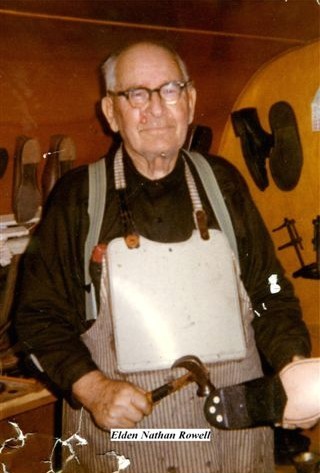



 After supper, Elden
returned to the easy chair, closed his
eyes, and reminiscence of the many
adventures of his lifetime. He had lived a
colorful eighty-plus years. Elden enjoyed
telling tales to spell-bound listeners at
the only octagonal-shaped retired post
office in the United States, which housed
the Liberty Historical Society. He had
donated many of his cobbler’s tools to
them, along with the large sign which
read, “E. N. ROWELL, successor to P. W.
ROWELL, BOOT and SHOE MAKER”.
After supper, Elden
returned to the easy chair, closed his
eyes, and reminiscence of the many
adventures of his lifetime. He had lived a
colorful eighty-plus years. Elden enjoyed
telling tales to spell-bound listeners at
the only octagonal-shaped retired post
office in the United States, which housed
the Liberty Historical Society. He had
donated many of his cobbler’s tools to
them, along with the large sign which
read, “E. N. ROWELL, successor to P. W.
ROWELL, BOOT and SHOE MAKER”. On a hot August night in
1908, he and some young friends were
drinking hard cider together. Elden
decided that if he had a dress suit, he
could make his way in the world. That very
night Hollis L. Jackson’s General Store in
South Montville was broken into. All that
was taken was a suit of clothes, a
revolver, and some small incidental items.
Elden had left Liberty. His ‘friends’ told
the Sheriff that Elden Rowell had been
looking for a suit of clothes. The
officers began searching for a
well-dressed, armed culprit.
On a hot August night in
1908, he and some young friends were
drinking hard cider together. Elden
decided that if he had a dress suit, he
could make his way in the world. That very
night Hollis L. Jackson’s General Store in
South Montville was broken into. All that
was taken was a suit of clothes, a
revolver, and some small incidental items.
Elden had left Liberty. His ‘friends’ told
the Sheriff that Elden Rowell had been
looking for a suit of clothes. The
officers began searching for a
well-dressed, armed culprit.  The Coast of Maine was
calling Elden home. He was tiring of the
constant travel. After all, he was a
pretty darn good cobbler. There was plenty
of work back home in Maine, making boots
and shoes. His Uncle P. W. Rowell, a
Master at cobbling, had died in 1911,
while Elden was away. It was time to go
home and settle down..
The Coast of Maine was
calling Elden home. He was tiring of the
constant travel. After all, he was a
pretty darn good cobbler. There was plenty
of work back home in Maine, making boots
and shoes. His Uncle P. W. Rowell, a
Master at cobbling, had died in 1911,
while Elden was away. It was time to go
home and settle down..  Once he settled down in his
own little house, he’d always had a cat.
The cat would keep rodents from the house,
as well as being great company. Once when
Elden was given a can of Spam, he shared
the contents with his cat. The cat refused
to eat it. Elden said that if the cat
wouldn’t eat it, then it warn’t fit’n to
eat.
Once he settled down in his
own little house, he’d always had a cat.
The cat would keep rodents from the house,
as well as being great company. Once when
Elden was given a can of Spam, he shared
the contents with his cat. The cat refused
to eat it. Elden said that if the cat
wouldn’t eat it, then it warn’t fit’n to
eat. When a customer brought a
pair of shoes to be repaired by his
skilled workmanship, Elden carefully
labeled them. If he was going away, he
would put out his sign, “DON’T LEVE NO
SHOES” with a big padlock on the door.
He’d take a cart, hauling the repaired
shoes to Abbie Hannan below the Village to
deliver to the right customer. He knew
that he could trust Abbie, but there were
a few people that he couldn’t trust “as
far as he could throw them”. He’d make the
mistake of over-trusting a few times in
his life.
When a customer brought a
pair of shoes to be repaired by his
skilled workmanship, Elden carefully
labeled them. If he was going away, he
would put out his sign, “DON’T LEVE NO
SHOES” with a big padlock on the door.
He’d take a cart, hauling the repaired
shoes to Abbie Hannan below the Village to
deliver to the right customer. He knew
that he could trust Abbie, but there were
a few people that he couldn’t trust “as
far as he could throw them”. He’d make the
mistake of over-trusting a few times in
his life.